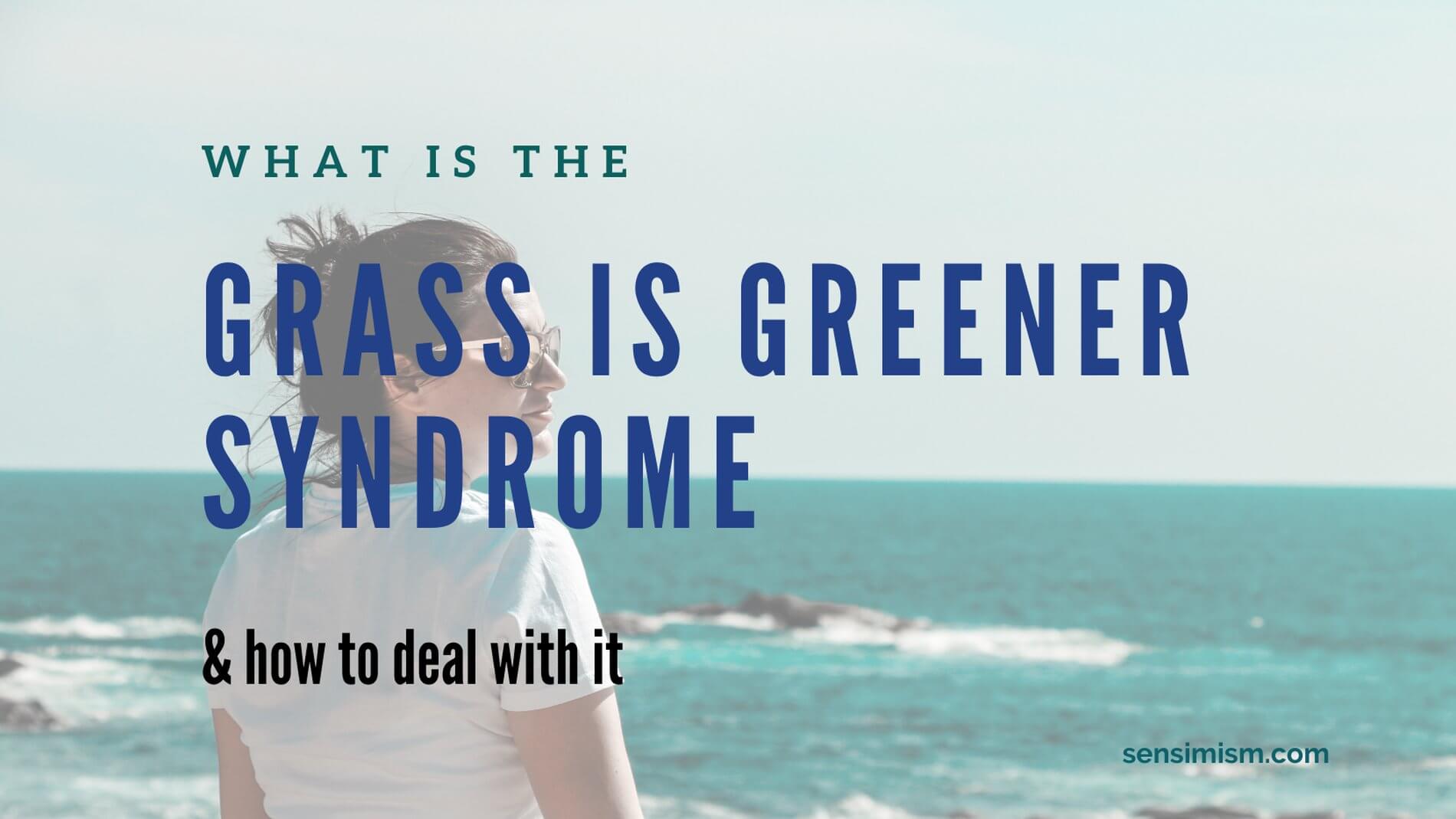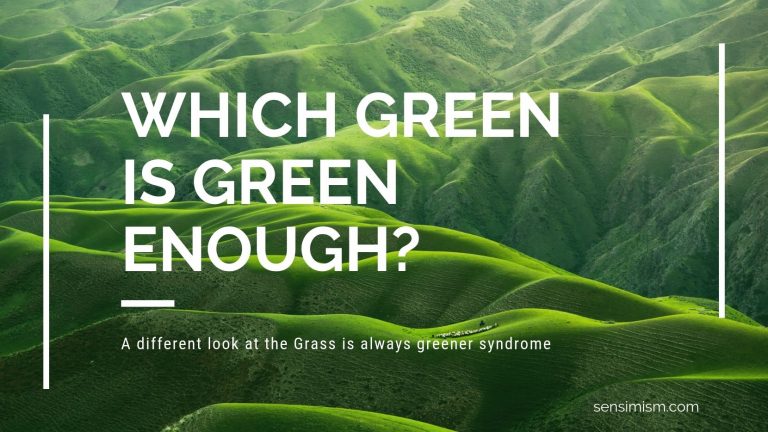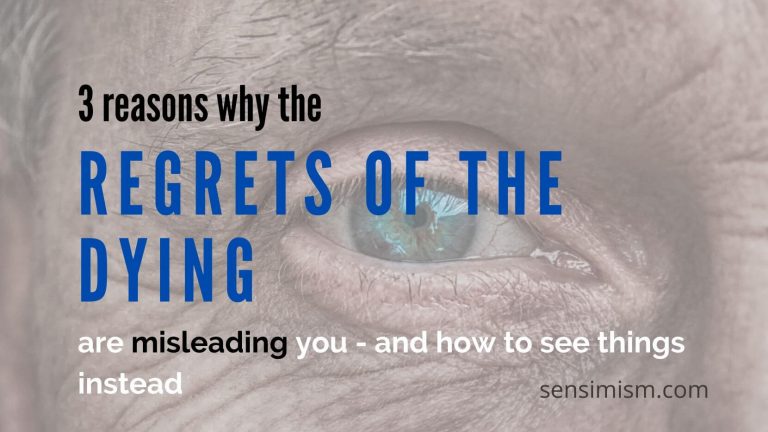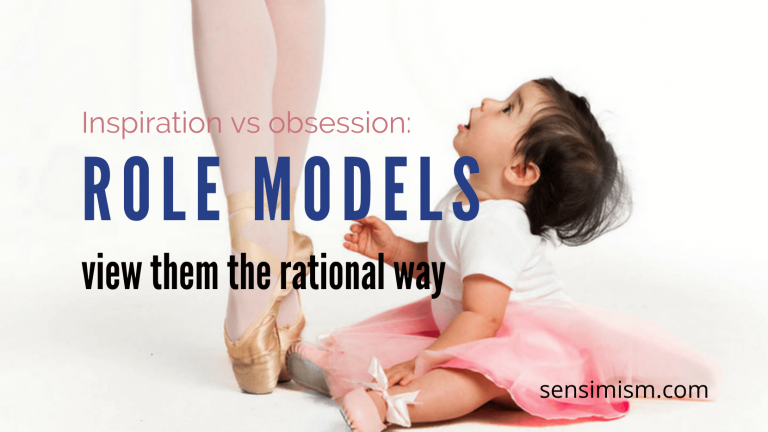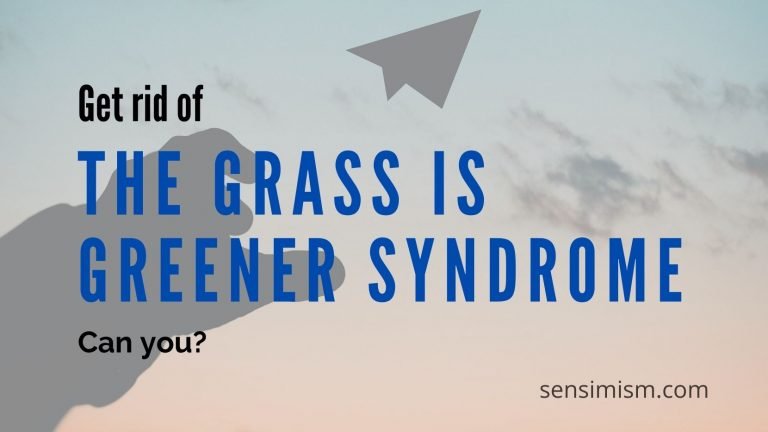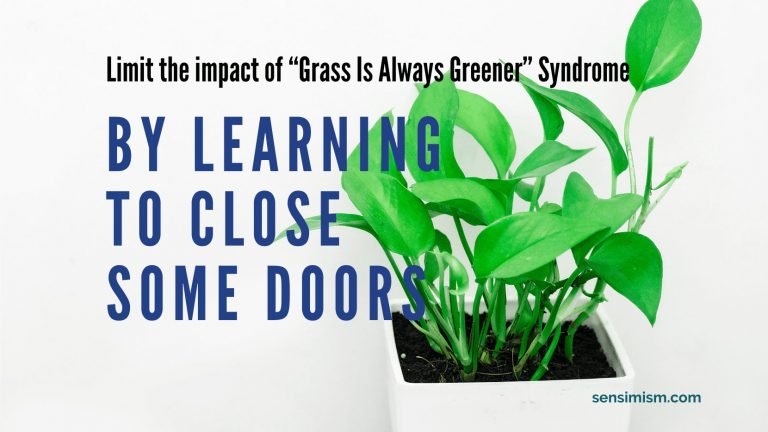What is the grass is greener syndrome and how to deal with it?
Ever feel like your life could be better? Passing people on the street and thinking that some element of their life is better than yours, that you’re missing something? Seeing people that seem prettier than your partner? Seeing other jobs or careers as better than yours? Many of us feel this way – that there is always something better out there, you just need to go and get it. This is, in short, the grass is always greener on the other side syndrome.
It is simple enough to describe, but difficult to deal with. The phrase itself is an umbrella name describing several psychological biases and fallacies (we’ll talk more about them in separate posts on this topic) that afflict many people and create a state of mind that is this syndrome. It can make your life difficult, but it is not, on its own, a dangerous condition. It can lead to more dangerous conditions like anxiety, withdrawal, it can lead to irrational decisions, but if you have a healthy level of self-control, you can reign it in. I have dealt with it myself and want to help others get out of it sooner. In my case, it was mostly about my relationship – comparing my girlfriend to others. It made life much more difficult and didn’t lead anywhere. I’m still with her and happier than before :). This post and pages are dedicated to helping you find a quick way out of the grass is greener way of thinking.
The grass is greener syndrome can easily be misinterpreted and comingled with other situations, so first, let’s get this out of the way:
What the green grass syndrome is not
- It is not looking for an escape from a genuinely bad / toxic / unhealthy / dangerous situation. It is important to recognize when you are genuinely in a bad situation and are looking for a way out vs not seeing a good situation as good and trying to find something better elsewhere – even if there’s no real reason to.
- It is not being ambitious – if you know you can achieve something better, you should go and get it. Ambition is good if it drives you forward and helps you improve, makes you a better human being. The problem arises, when this ambition is not rational – when it’s driven by hope rather than knowledge, skills or a calculated plan. When you build a career, you need to have some skills, a plan and some confidence to get there. That’s fine. But if you don’t have the skills and are not confident that you can get there, yet you still look elsewhere and think that you could be better if you tried X or Y, it’s not productive. It only makes your current situation seem worse (than it really is) and gives you false hope (because you don’t have a clear path to get there). This is the grass is greener (GIG) thinking.
- It is not jealousy – when you’re jealous, you don’t necessarily want what the other person has, you just don’t like them because they have it. You are not prepared to do all the work to get there, you just want to smirk at them because they have it and you don’t. That’s close, but it’s not the grass is greener syndrome. It would be if you started thinking that you need to do something to get it too – take action – quit your job, travel, move to another city, find a better partner. If it’s passive, it’s just good old moaning, an observation, jealousy. If it’s active – the feeling that there *is* something better for you just waiting for you to take it, that’s the GIG syndrome.
- It is not dreaming – innocent daydreaming is fine, feels good. As long as it doesn’t turn into an obsession that takes over your life, it’s fine. Dreams are seeds that might grow into a big tree if you work towards them.
There are probably other similar situations that can feel like the GIG syndrome – but there’s no need to describe them all. It’s much better to equip you with tools that will keep its effects on your life in check. Unfortunately, there’s nothing that will take it away completely – such is human nature, but here’s how you can reign it in and minimalise its influence over your life:
How to deal with the grass is greener syndrome
You can deal with it once you know how it works and how to handle the thoughts that go along with it.
Be VERY realistic and rational in your thinking – any shade of grass requires watering and has weeds
When you think about all the other, better options, make sure that you compare apples with apples. Don’t just take whatever is good in your current situation, then imagine that the new situation will only add more good to it. The reality is that you will also lose some of the good in your current situation, gain some new bad in the new situation and only maybe some better elements. In short – your new situation will be much more similar to your current one, whether you like it or not. Your “prettier” girlfriend will also have bad days or bad habits. You will be the same too, so whatever you suck in today, you will in that new situation too. The new city will also have issues – garbage, crime, pollution. Different levels, but they won’t disappear.
It’s mostly not real – just the fallacies and biases of your mind – that won’t go away
Would you feel this way if you didn’t know any better? Very likely you wouldn’t – you would be very content with what you have. So it’s not that you are not happy because the current situation is unbearable (that wouldn’t be the GIG syndrome), but you are not happy, because your mind thinks that there might be something better. And because of many biases and fallacies (loss aversion – you don’t want to give up on options you think you deserve, in today’s world we are swamped with options; negativity bias – you lose sight of the good you have because the bad weighs heavier on your mind; hedonic treadmill – however high a goal you set yourself, once you achieve it, it becomes routine and your new average; confirmation bias – tendency to look for and see the things that confirm our opinion, ignoring the ones that disprove it; and a close relative to grass is always greener – FOMO (fear of missing out)) – this feeling won’t go away once we change the situation. In the new situation, these fallacies and biases will still be there. And guess what will follow…
Inspiration from nature
Animals don’t have these biases – and we can see that in their genuine joy in seemingly normal situations (to us). Imagine a dog that is so happy to see his owner every time. He doesn’t overthink anything, he doesn’t desire a bigger bone or more time with his friend, he just feels happy with whatever life throws at him. Try to be more like that dog in your situation :).
It’s one of our disadvantages of having such a big and complex brain. Guess all that creative thinking comes at a price. Or we just need to apply that creative thinking to manage some of the more instinctive – lizard brain – thinking.
Questions to ask yourself
- Is my situation no longer bearable and is destroying my life or health? If you answer yes – then do something about it (it’s not the GIG syndrome). If you can’t answer a clear yes, ask further:
- Am I unhappy, because I want more, better, nicer (despite the fact that what I have is good and hasn’t changed from when I first wanted it) – or – because I have tried all, it is going down the hill and has changed too much since the initial state, and am still very unhappy?
- Are you thinking “I need to find a way out of this because it’s bad for me”? (= this isn’t grass is greener syndrome) or “Maybe I can have something better than this.” (=this is the grass is greener syndrome)
- Is my thinking based on real facts, or my imagination/projection? For example – “I feel that there’s a better man out there for me” is a fantasy, until you really know someone deeply and for a long time, can compare him with your current man fairly (apples vs apples). If your thinking is based on a single experience, hence likely a fantasy (after a holiday in a different city, you want to live there, despite not knowing what real life there feels like and feel your city is rubbish now) compared to some research (comparing the cost of living in your city vs the other city, the work opportunities and what elements of life fit better in each). Are you comparing your imagined benefits and advantages of the better option, with the real-life routine of the current option, or are you comparing both on the same level?
- Do I know any people that made big changes in their lives? How are they now – do they still find things to complain about, or do they live in the utopia that I imagine to myself?
What to read next
- The grass is greener – on which side? – could it be that what you see as greener and less green, others see in reverse?
- How To Stay Sane And Happy – In Bullet Points – If You Prefer Short And To The Point Writing 🙂
- Key principles of sensimism – to make dealing with the grass is greener syndrome easier on you
- Balance: a key to a happier life – three steps to help you achieve a better balance in life
- How to overcome obstacles – the way nature does
